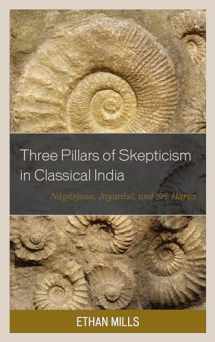
Three Pillars of Skepticism in Classical India: Nagarjuna, Jayarasi, and Sri Harsa (Studies in Comparative Philosophy and Religion)
Book details
Summary
Description
Review
"Three Pillars of Skepticism in Classical India: Nagarjuna, Jayarasi and Sri Harsa", is truly a valuable addition to the publications on Indian philosophy. Even if an advanced reader may later discover that what the three pillars--Nagarjuna, Jayarasi and Sri Harsa--support is not necessarily constructed of skepticism bricks, the path to the discovery via Ethan Mills' road-signs and guideposts, most engaging to read, is worth it all. ― Philosophy East and West
The Three Pillars is engagingly written. Mills brings his audience into Indian philosophy by making connections to contemporary Anglo-European philosophy, as well as global philosophies. The book is clear and engaging. ― Journal of Dharma Studies
The Three Pillars is engagingly written. . . Mills’ attention to shared methodologies and concerns is a welcome contribution to the ongoing correction to that division. Further, Three Pillars considers connections among thinkers beyond India (in Greece, Persia, and China). This global vantage point is a welcome aspect to the book, taking it beyond a simple Indian/"Western" framework. . . . [B]y drawing our attention to similarities among such disparate thinkers, Mills has done an important service to philosophers interested in global epistemologies. The book is clear and engaging. . . new-comers to Indian philosophy will find the book a useful, if controversial, introduction to three important thinkers. Three Pillars of Skepticism in Classical India should spur further inquiry into each of the three “pillars” and their relationship to philosophy in premodern South Asia and the rest of the world.” ― Journal of Dharma Studies
Ethan Mills has written a lovely book on Indian skepticism. It shows that skepticism is not merely a Greek phenomenon, but enjoys a long history in India. This book addresses skepticism both in the orthodox and Buddhist traditions, and enriches our understanding of the interaction between those traditions and the development of philosophical dialectics in India. The account is erudite, nuanced, full of good translation and exposition. It is philosophically sophisticated, and easy to read. Anyone interested in skepticism or in Indian philosophy should read it. -- Jay Garfield, Smith College
This book offers thought-provoking interpretations of three major figures in Indian thought. With technical precision, careful translation, and most notably, insightful comparisons with Western discussions, Mills makes an impressive and persuasive case for 'expanding the history of philosophical skepticism', and leads us to think afresh about the purposes and limits of doing philosophy today. -- Chakravarthi Ram-Prasad, Lancaster University
Ethan Mills makes a strong case for the skeptical positions of Nāgārjuna, Jayarāśi and Śrī Harṣa, which according to him should be appreciated as forms of "skepticism about philosophy" rather than epistemological skepticism. This is something any lover of philosophy should take seriously. -- Pradeep Gokhale, Savitribai Phule Pune University
Beginning with the earliest strata of Indian philosophy, this book uncovers a distinct tradition of skepticism in Indian philosophy through a study of the “three pillars” of Indian skepticism near the beginning, middle, and end of the classical era: Nāgārjuna (c. 150-200 CE), Jayarāśi (c. 770-830 CE), and Śrī Harṣa (c. 1125-1180 CE). Moving beyond the traditional school model of understanding the history of Indian philosophy, this book argues that the philosophical history of India contains a tradition of skepticism about philosophy represented most clearly by three figures coming from different schools but utilizing similar methods: Nāgārjuna, Jayarāśi, and Śrī Harṣa. This book argues that there is a category of skepticism often overlooked by philosophers today: skepticism about philosophy, varieties of which are found not only in classical India but also in the Western tradition in Pyrrhonian skepticism. Skepticism


We would LOVE it if you could help us and other readers by reviewing the book
Book review



